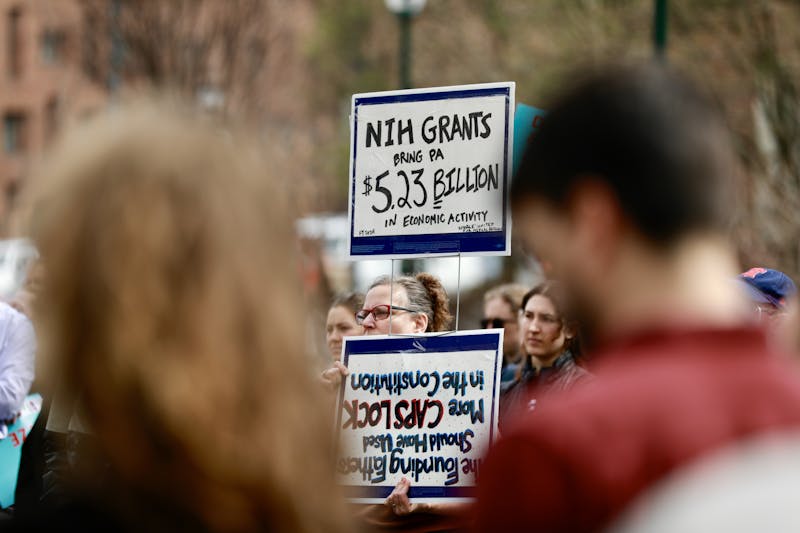
Ican't wait until I turn 21. It's not so I can legally buy a drink (although I suppose that's a nice benefit). I can't wait until my next birthday so I can gamble. I want to be able to hop on a bus and go to Atlantic City to play blackjack. It's one of my life goals to enter the World Series of Poker one day. I've driven nearly four hours in Los Angeles traffic to get to the only 18-and-over casino in the area. I've gone to Montreal in January (a place so cold your nose hairs actually freeze) to play craps.
Like countless others on this campus, I'm a big poker fan. I get e-mails from the Penn Poker listserv for Texas Hold' Em games starting at all hours of the day. In an attempt to capitalize on poker's popularity, the Phi Kappa Sigma fraternity recently tried to hold a poker tournament for charity. Rather than acknowledge the creativity of this fundraiser, University officials chose to call off the tournament.
The Daily Pennsylvanian reported that the fraternity planned to hold an 80-person tournament last week. The entry fee of $10 would have been donated to the local Philadelphia chapter of the Leukemia and Lymphoma Society. Local businesses and the fraternity planned to give non-cash prizes to top-ranking competitors.
The University called off the event because "any event that awards prizes worth more than the entry fee would be considered gambling and would thus be considered in violation of state law." While initially it seems that this rationale would ban any fundraiser, since most routinely give out prizes worth more than the entry price, poker was an exception. Brenda Fraser, associate general counsel for the University, remarked in the DP that, unlike athletic games or Quizzo, which are games of skill, poker qualifies as a game of chance.
There are two big problems with this ruling. The first has to do with the justification and the second with the situation itself. Anyone who has ever played poker will tell you that while luck is involved, experienced players will routinely beat beginners. It's indubitable that in any absolute, relative or general sense of the word, Doyle Brunson and Howard Lederer are some of the best players in the world. It's not because they always get the best cards. It's because they are skilled. One of the reasons why people love poker so much is that skill consistently mitigates luck if you play smart. It takes skill to read an opponent and know how to extract the greatest amount of money from him.
The skills involved in playing poker are no different from the skills involved in Quizzo. In fact, I'd argue that in events like Quizzo, there's no skill involved and a tremendous amount of luck. You could get lucky and know the answers to the question that no one else does. Does that make it a game of chance too? Raffles are by definition games of chance. Yet for some reason, they are legal because "they are covered by a different statute," according to Fraser. Why should they be?
The other problem with this decision is the blatant disregard for the context of the situation. The fraternity donated all the money raised to charity. It should seem patently obvious that this is a good idea and should be encouraged. This event had been planned for months and was called off just because the prizes were valued at more than $10. This seems like an arbitrary distinction. What difference does it make how highly the prizes are valued? Let's hypothetically say that the prizes were worth less than $10 (sticks of gum for all!). Why would that make the event allowable? That's why people enter raffles. There needs to be some sort of incentive. It's great that people support a cause, but that's not always enough. Prizes are a great way to encourage greater donations.
Penn Poker Society President Dan Kline informed me that last year, his club held a tournament with a suggested donation of $4. The organizers received private sponsorship and were able to give away a total of $2,000 in prizes. All the donations went to charity. They're planning on holding another tournament this year. The club is sponsored with $9,000 for prizes from an online casino with suggested donations of $2 or $3. Why does the University feel so compelled to crack down on these poker charity events? Kline rationalized it by saying people are paying a few bucks for entertainment. That money is going to a good cause. Seemingly, it's a win-win situation.
Philanthropy has always been an integral part of Greek life, not to mention its importance to countless other organizations on campus. These groups should be encouraged to come up with creative ways to raise money for charities they support. The University should support them in this endeavor. Sometimes it's better to look at the spirit, not the letter of the law.
Craig Cohen is a Wharton junior from Woodbury, N.Y. He Hate Me appears on Fridays.
The Daily Pennsylvanian is an independent, student-run newspaper. Please consider making a donation to support the coverage that shapes the University. Your generosity ensures a future of strong journalism at Penn.
DonatePlease note All comments are eligible for publication in The Daily Pennsylvanian.







